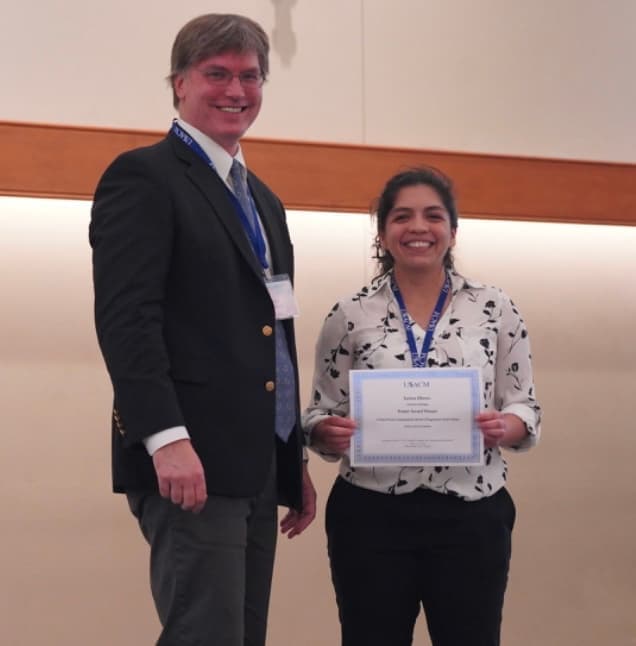
BME STUDENT WINS FIRST PLACE IN POSTER COMPETITION IN COMPUTATIONAL BIOLOGICAL SYSTEMS
Student receives honor at the premier U.S. venue for showcasing the latest research in the broad field of computational mechanics.

Student receives honor at the premier U.S. venue for showcasing the latest research in the broad field of computational mechanics.
Congratulations to U-M BME PhD student Javiera Jilberto Vallejos, who received first place in the category of computational biological systems in a student poster competition, held in conjunction with the 17th U.S. National Conference of Computational Mechanics.
The biennial congress, which happened in New Mexico in late July, is the premier U.S. venue for showcasing the latest research in the broad field of computational mechanics, bringing together top researchers and practitioners in academia, government and industry from around the world.
Jilberto’s poster focused on developing computational models to understand the relationship between the mechanical environment and cardiomyocyte maturation, which is the variety of changes to cell structure, metabolism, function and gene expression that convert fetal cardiomyocytes to adult cardiomyocytes. She created her poster in collaboration with the Baker Lab, where heart tissue is engineered.
“They try to understand how mechanics drive cardiomyocyte maturation, but there are a lot of mechanisms that are difficult to quantify, so we need to use a computational approach,” Jilberto explained. “We wanted to quantify how mechanics were changing the things that the team was observing.”
“They have a lot of data and many images,” she added. “So what I did was take all the images and all the functional information that they have to build a very detailed model of these tissues. For example, in cardiac mechanics, what our lab usually does is to create digital twins, where we grab the images from the patient’s heart and we build a virtual model of that heart. For this project, the idea was to do the same–to capture all the data that they have from these tissues and create a model so that we can better understand how the mechanical response is changing and measure quantities that they cannot typically measure experimentally. We can, for example, measure the stress that the cells are generating instead of relying on a global measure of tissue deformation to assess the mechanical function of the tissues.”
This research is conducted as part of an NSF Engineer Research Center (ERC) grant. Jilberto will be starting her fourth year in August as a student of David Nordsletten, Associate Professor, Department of Biomedical Engineering and Cardiac Surgery. The poster competition rubric focused on technical content, clarity and organization, and the question-and-answer section. Jilberto’s poster was first among nine competitors who were selected from a larger group of applicants to compete.